Crude Oil Prices: Factors Affecting Fluctuations and Welfare Implications
VerifiedAdded on 2023/06/13
|11
|2264
|489
AI Summary
This report explores the factors affecting crude oil prices and their welfare implications. It covers exchange outcomes, market forces, government intervention, and more. The report also analyzes the benefits and limitations international firms in the United Kingdom had to encounter whilst in the European Union after the Brexit Vote.
Contribute Materials
Your contribution can guide someone’s learning journey. Share your
documents today.
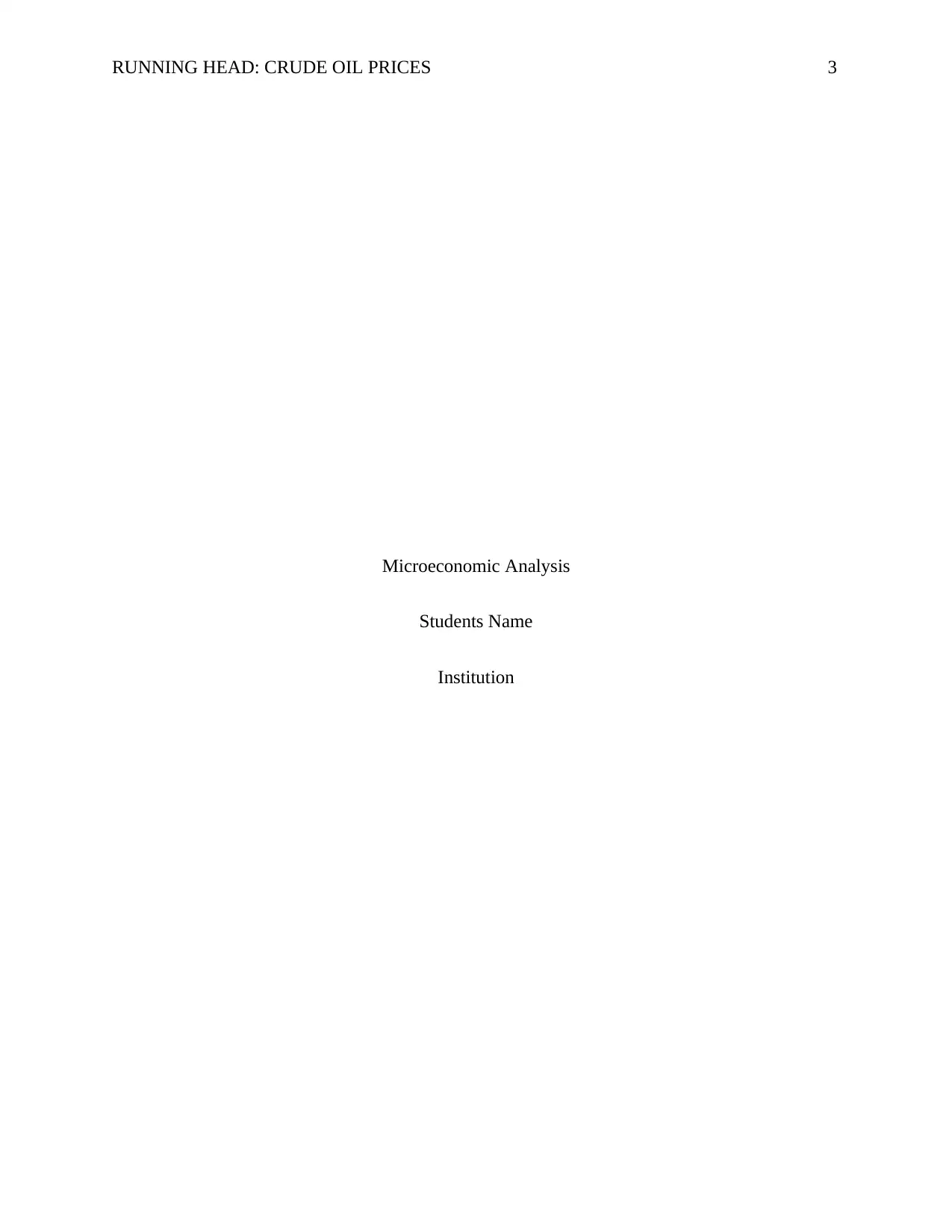
RUNNING HEAD: CRUDE OIL PRICES 3
Microeconomic Analysis
Students Name
Institution
Microeconomic Analysis
Students Name
Institution
Secure Best Marks with AI Grader
Need help grading? Try our AI Grader for instant feedback on your assignments.
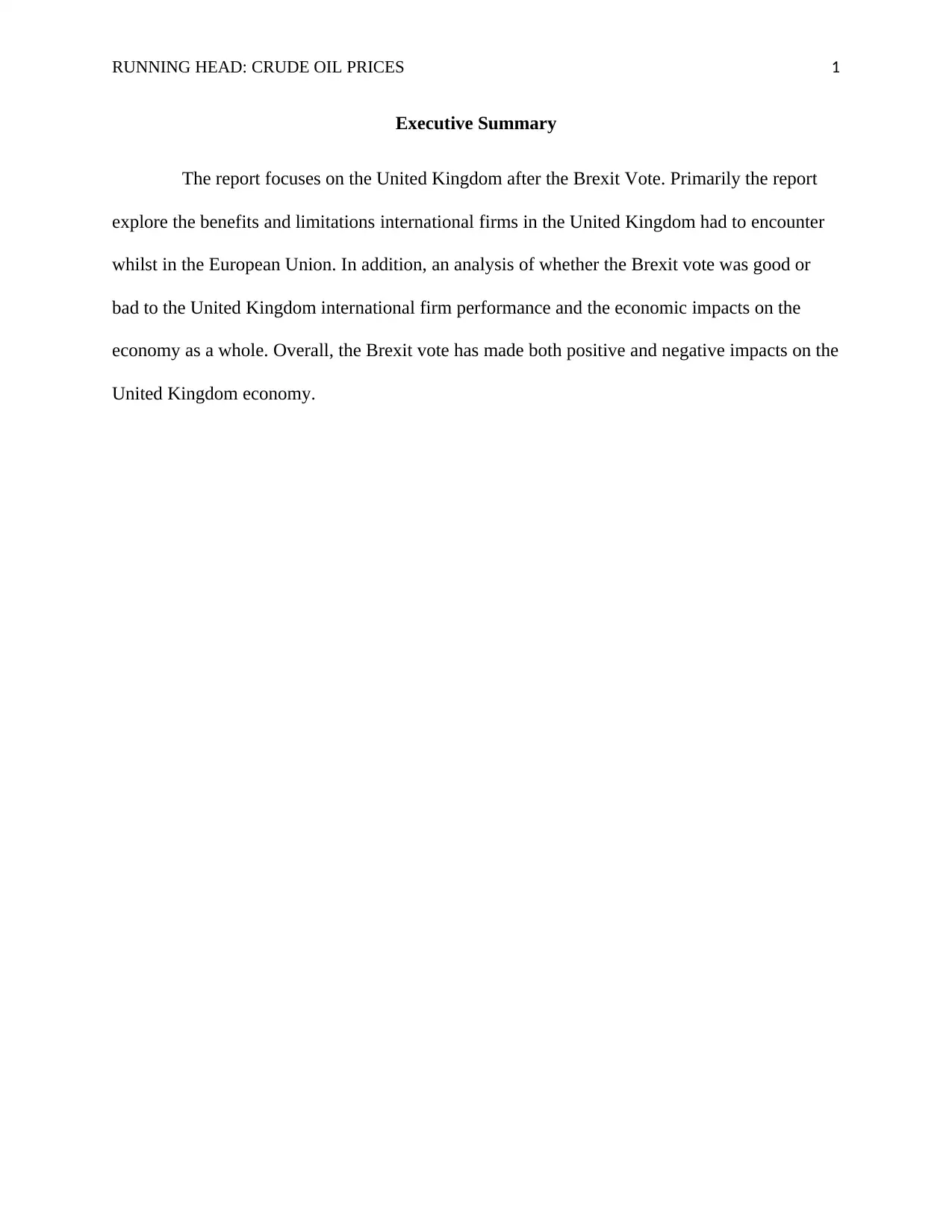
RUNNING HEAD: CRUDE OIL PRICES 1
Executive Summary
The report focuses on the United Kingdom after the Brexit Vote. Primarily the report
explore the benefits and limitations international firms in the United Kingdom had to encounter
whilst in the European Union. In addition, an analysis of whether the Brexit vote was good or
bad to the United Kingdom international firm performance and the economic impacts on the
economy as a whole. Overall, the Brexit vote has made both positive and negative impacts on the
United Kingdom economy.
Executive Summary
The report focuses on the United Kingdom after the Brexit Vote. Primarily the report
explore the benefits and limitations international firms in the United Kingdom had to encounter
whilst in the European Union. In addition, an analysis of whether the Brexit vote was good or
bad to the United Kingdom international firm performance and the economic impacts on the
economy as a whole. Overall, the Brexit vote has made both positive and negative impacts on the
United Kingdom economy.
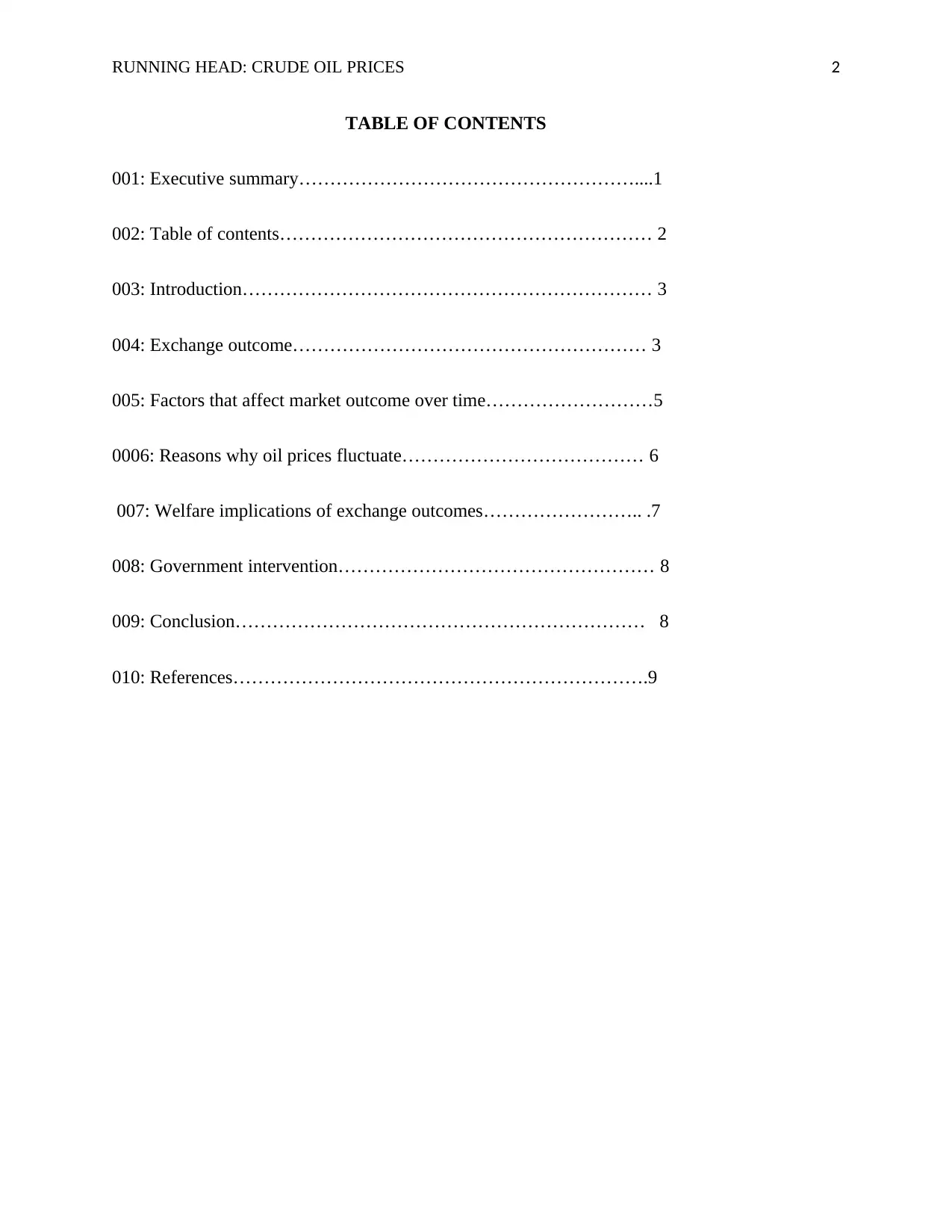
RUNNING HEAD: CRUDE OIL PRICES 2
TABLE OF CONTENTS
001: Executive summary………………………………………………....1
002: Table of contents…………………………………………………… 2
003: Introduction………………………………………………………… 3
004: Exchange outcome………………………………………………… 3
005: Factors that affect market outcome over time………………………5
0006: Reasons why oil prices fluctuate………………………………… 6
007: Welfare implications of exchange outcomes…………………….. .7
008: Government intervention…………………………………………… 8
009: Conclusion………………………………………………………… 8
010: References………………………………………………………….9
TABLE OF CONTENTS
001: Executive summary………………………………………………....1
002: Table of contents…………………………………………………… 2
003: Introduction………………………………………………………… 3
004: Exchange outcome………………………………………………… 3
005: Factors that affect market outcome over time………………………5
0006: Reasons why oil prices fluctuate………………………………… 6
007: Welfare implications of exchange outcomes…………………….. .7
008: Government intervention…………………………………………… 8
009: Conclusion………………………………………………………… 8
010: References………………………………………………………….9
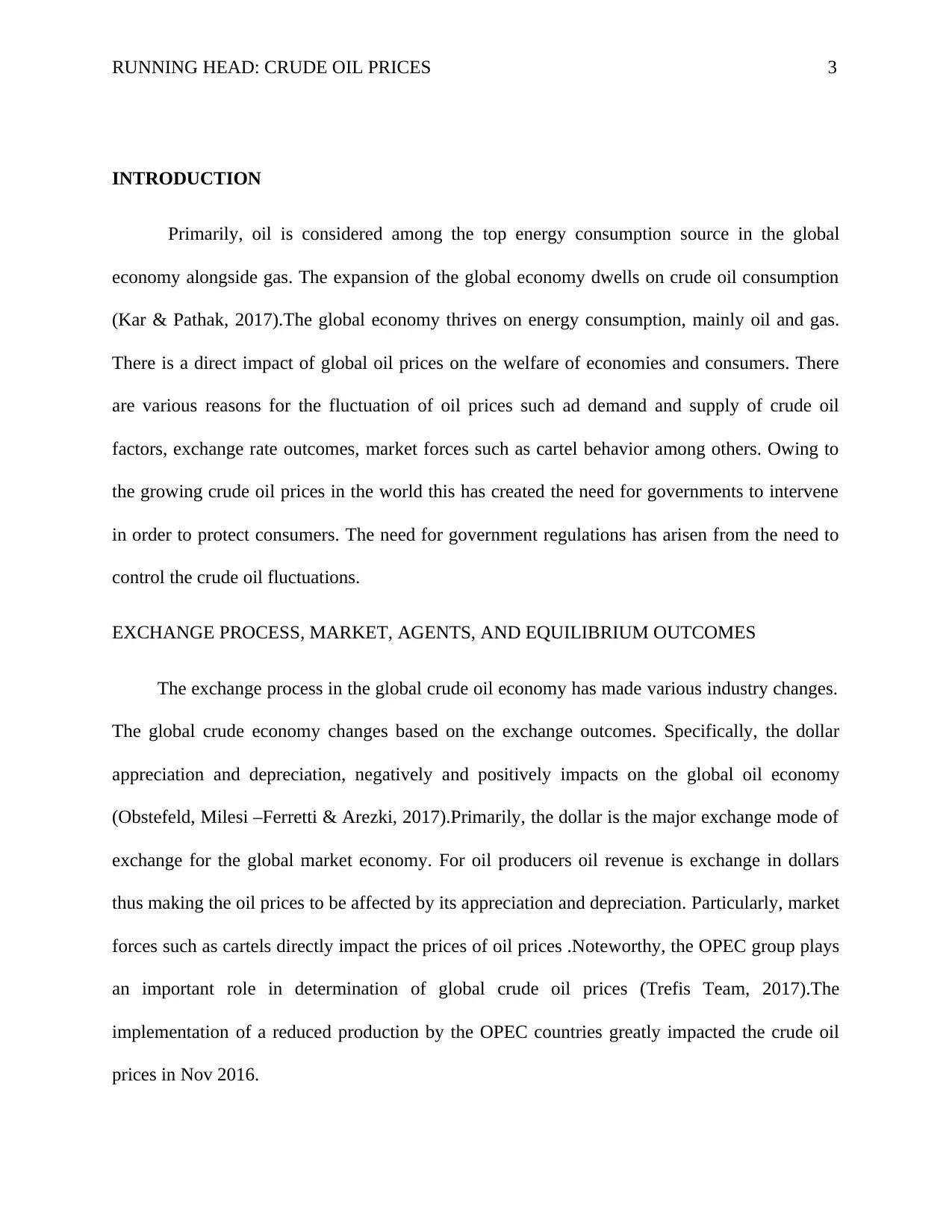
RUNNING HEAD: CRUDE OIL PRICES 3
INTRODUCTION
Primarily, oil is considered among the top energy consumption source in the global
economy alongside gas. The expansion of the global economy dwells on crude oil consumption
(Kar & Pathak, 2017).The global economy thrives on energy consumption, mainly oil and gas.
There is a direct impact of global oil prices on the welfare of economies and consumers. There
are various reasons for the fluctuation of oil prices such ad demand and supply of crude oil
factors, exchange rate outcomes, market forces such as cartel behavior among others. Owing to
the growing crude oil prices in the world this has created the need for governments to intervene
in order to protect consumers. The need for government regulations has arisen from the need to
control the crude oil fluctuations.
EXCHANGE PROCESS, MARKET, AGENTS, AND EQUILIBRIUM OUTCOMES
The exchange process in the global crude oil economy has made various industry changes.
The global crude economy changes based on the exchange outcomes. Specifically, the dollar
appreciation and depreciation, negatively and positively impacts on the global oil economy
(Obstefeld, Milesi –Ferretti & Arezki, 2017).Primarily, the dollar is the major exchange mode of
exchange for the global market economy. For oil producers oil revenue is exchange in dollars
thus making the oil prices to be affected by its appreciation and depreciation. Particularly, market
forces such as cartels directly impact the prices of oil prices .Noteworthy, the OPEC group plays
an important role in determination of global crude oil prices (Trefis Team, 2017).The
implementation of a reduced production by the OPEC countries greatly impacted the crude oil
prices in Nov 2016.
INTRODUCTION
Primarily, oil is considered among the top energy consumption source in the global
economy alongside gas. The expansion of the global economy dwells on crude oil consumption
(Kar & Pathak, 2017).The global economy thrives on energy consumption, mainly oil and gas.
There is a direct impact of global oil prices on the welfare of economies and consumers. There
are various reasons for the fluctuation of oil prices such ad demand and supply of crude oil
factors, exchange rate outcomes, market forces such as cartel behavior among others. Owing to
the growing crude oil prices in the world this has created the need for governments to intervene
in order to protect consumers. The need for government regulations has arisen from the need to
control the crude oil fluctuations.
EXCHANGE PROCESS, MARKET, AGENTS, AND EQUILIBRIUM OUTCOMES
The exchange process in the global crude oil economy has made various industry changes.
The global crude economy changes based on the exchange outcomes. Specifically, the dollar
appreciation and depreciation, negatively and positively impacts on the global oil economy
(Obstefeld, Milesi –Ferretti & Arezki, 2017).Primarily, the dollar is the major exchange mode of
exchange for the global market economy. For oil producers oil revenue is exchange in dollars
thus making the oil prices to be affected by its appreciation and depreciation. Particularly, market
forces such as cartels directly impact the prices of oil prices .Noteworthy, the OPEC group plays
an important role in determination of global crude oil prices (Trefis Team, 2017).The
implementation of a reduced production by the OPEC countries greatly impacted the crude oil
prices in Nov 2016.
Secure Best Marks with AI Grader
Need help grading? Try our AI Grader for instant feedback on your assignments.
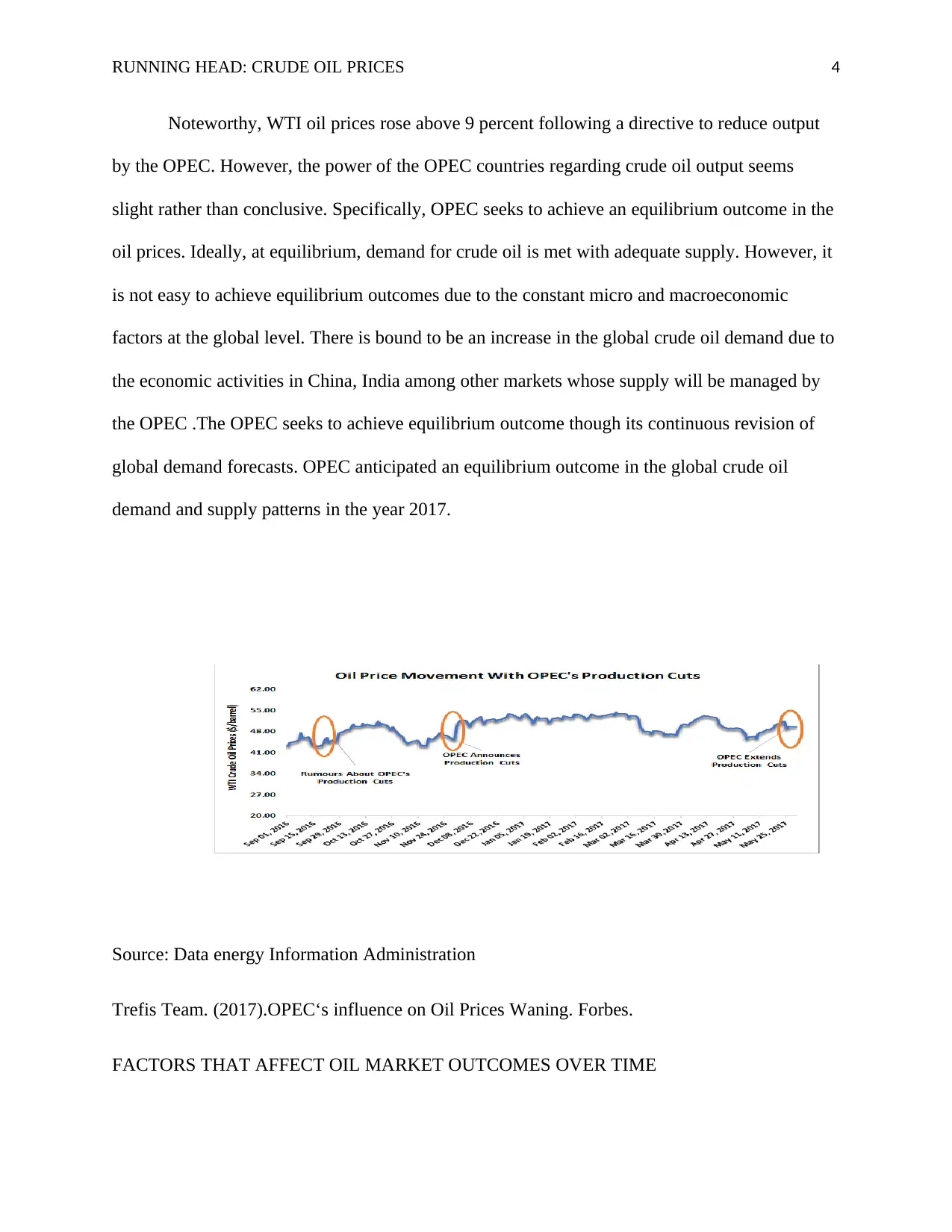
RUNNING HEAD: CRUDE OIL PRICES 4
Noteworthy, WTI oil prices rose above 9 percent following a directive to reduce output
by the OPEC. However, the power of the OPEC countries regarding crude oil output seems
slight rather than conclusive. Specifically, OPEC seeks to achieve an equilibrium outcome in the
oil prices. Ideally, at equilibrium, demand for crude oil is met with adequate supply. However, it
is not easy to achieve equilibrium outcomes due to the constant micro and macroeconomic
factors at the global level. There is bound to be an increase in the global crude oil demand due to
the economic activities in China, India among other markets whose supply will be managed by
the OPEC .The OPEC seeks to achieve equilibrium outcome though its continuous revision of
global demand forecasts. OPEC anticipated an equilibrium outcome in the global crude oil
demand and supply patterns in the year 2017.
Source: Data energy Information Administration
Trefis Team. (2017).OPEC‘s influence on Oil Prices Waning. Forbes.
FACTORS THAT AFFECT OIL MARKET OUTCOMES OVER TIME
Noteworthy, WTI oil prices rose above 9 percent following a directive to reduce output
by the OPEC. However, the power of the OPEC countries regarding crude oil output seems
slight rather than conclusive. Specifically, OPEC seeks to achieve an equilibrium outcome in the
oil prices. Ideally, at equilibrium, demand for crude oil is met with adequate supply. However, it
is not easy to achieve equilibrium outcomes due to the constant micro and macroeconomic
factors at the global level. There is bound to be an increase in the global crude oil demand due to
the economic activities in China, India among other markets whose supply will be managed by
the OPEC .The OPEC seeks to achieve equilibrium outcome though its continuous revision of
global demand forecasts. OPEC anticipated an equilibrium outcome in the global crude oil
demand and supply patterns in the year 2017.
Source: Data energy Information Administration
Trefis Team. (2017).OPEC‘s influence on Oil Prices Waning. Forbes.
FACTORS THAT AFFECT OIL MARKET OUTCOMES OVER TIME
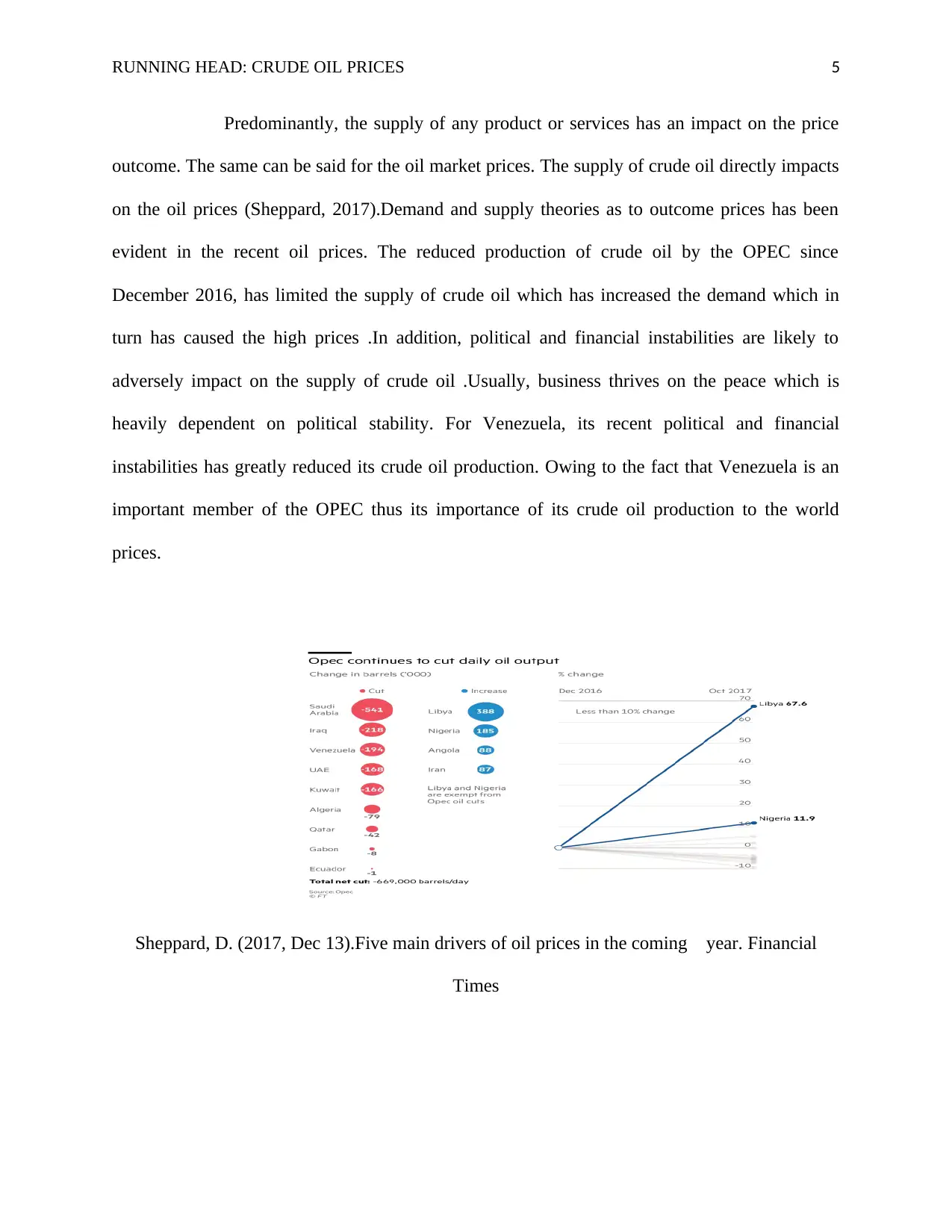
RUNNING HEAD: CRUDE OIL PRICES 5
Predominantly, the supply of any product or services has an impact on the price
outcome. The same can be said for the oil market prices. The supply of crude oil directly impacts
on the oil prices (Sheppard, 2017).Demand and supply theories as to outcome prices has been
evident in the recent oil prices. The reduced production of crude oil by the OPEC since
December 2016, has limited the supply of crude oil which has increased the demand which in
turn has caused the high prices .In addition, political and financial instabilities are likely to
adversely impact on the supply of crude oil .Usually, business thrives on the peace which is
heavily dependent on political stability. For Venezuela, its recent political and financial
instabilities has greatly reduced its crude oil production. Owing to the fact that Venezuela is an
important member of the OPEC thus its importance of its crude oil production to the world
prices.
Sheppard, D. (2017, Dec 13).Five main drivers of oil prices in the coming year. Financial
Times
Predominantly, the supply of any product or services has an impact on the price
outcome. The same can be said for the oil market prices. The supply of crude oil directly impacts
on the oil prices (Sheppard, 2017).Demand and supply theories as to outcome prices has been
evident in the recent oil prices. The reduced production of crude oil by the OPEC since
December 2016, has limited the supply of crude oil which has increased the demand which in
turn has caused the high prices .In addition, political and financial instabilities are likely to
adversely impact on the supply of crude oil .Usually, business thrives on the peace which is
heavily dependent on political stability. For Venezuela, its recent political and financial
instabilities has greatly reduced its crude oil production. Owing to the fact that Venezuela is an
important member of the OPEC thus its importance of its crude oil production to the world
prices.
Sheppard, D. (2017, Dec 13).Five main drivers of oil prices in the coming year. Financial
Times
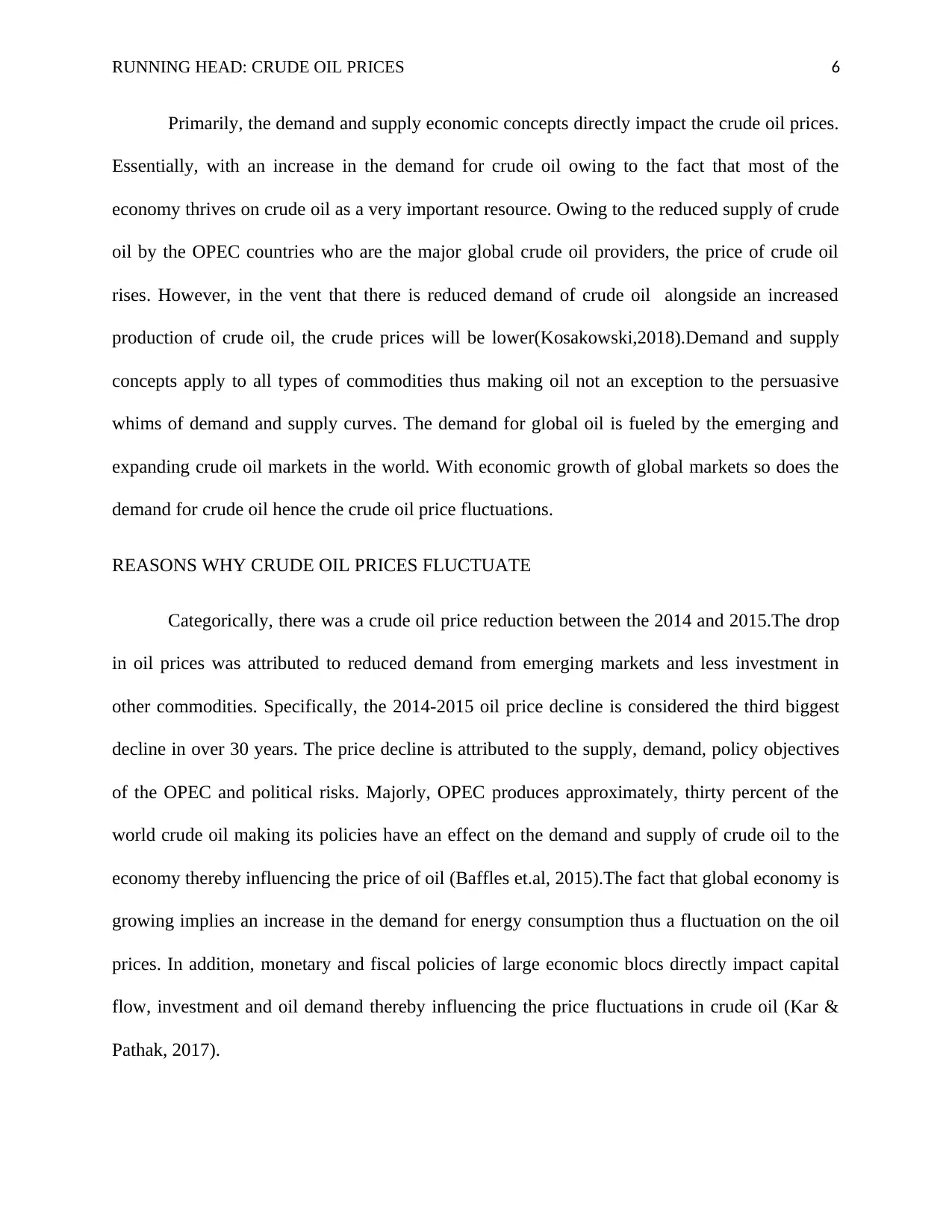
RUNNING HEAD: CRUDE OIL PRICES 6
Primarily, the demand and supply economic concepts directly impact the crude oil prices.
Essentially, with an increase in the demand for crude oil owing to the fact that most of the
economy thrives on crude oil as a very important resource. Owing to the reduced supply of crude
oil by the OPEC countries who are the major global crude oil providers, the price of crude oil
rises. However, in the vent that there is reduced demand of crude oil alongside an increased
production of crude oil, the crude prices will be lower(Kosakowski,2018).Demand and supply
concepts apply to all types of commodities thus making oil not an exception to the persuasive
whims of demand and supply curves. The demand for global oil is fueled by the emerging and
expanding crude oil markets in the world. With economic growth of global markets so does the
demand for crude oil hence the crude oil price fluctuations.
REASONS WHY CRUDE OIL PRICES FLUCTUATE
Categorically, there was a crude oil price reduction between the 2014 and 2015.The drop
in oil prices was attributed to reduced demand from emerging markets and less investment in
other commodities. Specifically, the 2014-2015 oil price decline is considered the third biggest
decline in over 30 years. The price decline is attributed to the supply, demand, policy objectives
of the OPEC and political risks. Majorly, OPEC produces approximately, thirty percent of the
world crude oil making its policies have an effect on the demand and supply of crude oil to the
economy thereby influencing the price of oil (Baffles et.al, 2015).The fact that global economy is
growing implies an increase in the demand for energy consumption thus a fluctuation on the oil
prices. In addition, monetary and fiscal policies of large economic blocs directly impact capital
flow, investment and oil demand thereby influencing the price fluctuations in crude oil (Kar &
Pathak, 2017).
Primarily, the demand and supply economic concepts directly impact the crude oil prices.
Essentially, with an increase in the demand for crude oil owing to the fact that most of the
economy thrives on crude oil as a very important resource. Owing to the reduced supply of crude
oil by the OPEC countries who are the major global crude oil providers, the price of crude oil
rises. However, in the vent that there is reduced demand of crude oil alongside an increased
production of crude oil, the crude prices will be lower(Kosakowski,2018).Demand and supply
concepts apply to all types of commodities thus making oil not an exception to the persuasive
whims of demand and supply curves. The demand for global oil is fueled by the emerging and
expanding crude oil markets in the world. With economic growth of global markets so does the
demand for crude oil hence the crude oil price fluctuations.
REASONS WHY CRUDE OIL PRICES FLUCTUATE
Categorically, there was a crude oil price reduction between the 2014 and 2015.The drop
in oil prices was attributed to reduced demand from emerging markets and less investment in
other commodities. Specifically, the 2014-2015 oil price decline is considered the third biggest
decline in over 30 years. The price decline is attributed to the supply, demand, policy objectives
of the OPEC and political risks. Majorly, OPEC produces approximately, thirty percent of the
world crude oil making its policies have an effect on the demand and supply of crude oil to the
economy thereby influencing the price of oil (Baffles et.al, 2015).The fact that global economy is
growing implies an increase in the demand for energy consumption thus a fluctuation on the oil
prices. In addition, monetary and fiscal policies of large economic blocs directly impact capital
flow, investment and oil demand thereby influencing the price fluctuations in crude oil (Kar &
Pathak, 2017).
Paraphrase This Document
Need a fresh take? Get an instant paraphrase of this document with our AI Paraphraser
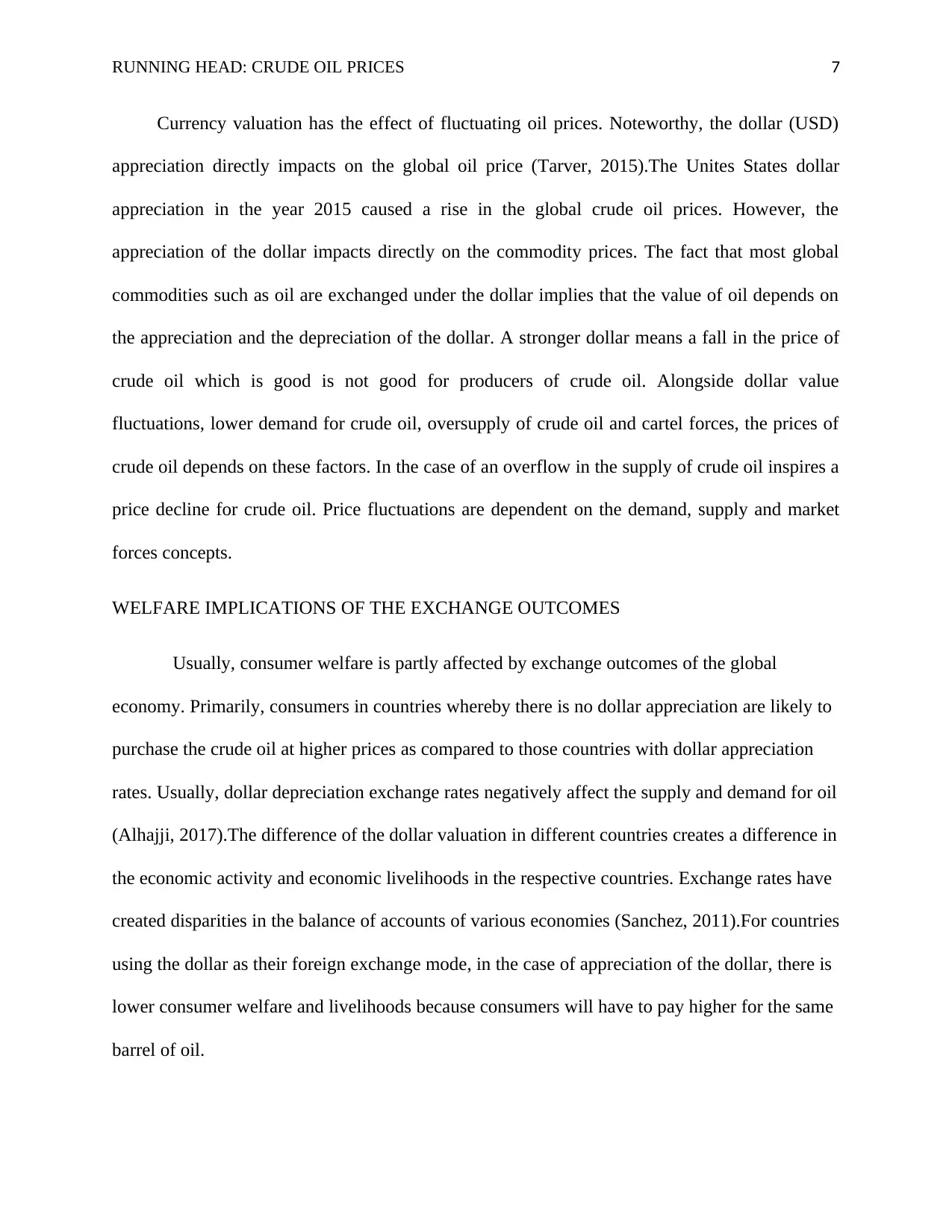
RUNNING HEAD: CRUDE OIL PRICES 7
Currency valuation has the effect of fluctuating oil prices. Noteworthy, the dollar (USD)
appreciation directly impacts on the global oil price (Tarver, 2015).The Unites States dollar
appreciation in the year 2015 caused a rise in the global crude oil prices. However, the
appreciation of the dollar impacts directly on the commodity prices. The fact that most global
commodities such as oil are exchanged under the dollar implies that the value of oil depends on
the appreciation and the depreciation of the dollar. A stronger dollar means a fall in the price of
crude oil which is good is not good for producers of crude oil. Alongside dollar value
fluctuations, lower demand for crude oil, oversupply of crude oil and cartel forces, the prices of
crude oil depends on these factors. In the case of an overflow in the supply of crude oil inspires a
price decline for crude oil. Price fluctuations are dependent on the demand, supply and market
forces concepts.
WELFARE IMPLICATIONS OF THE EXCHANGE OUTCOMES
Usually, consumer welfare is partly affected by exchange outcomes of the global
economy. Primarily, consumers in countries whereby there is no dollar appreciation are likely to
purchase the crude oil at higher prices as compared to those countries with dollar appreciation
rates. Usually, dollar depreciation exchange rates negatively affect the supply and demand for oil
(Alhajji, 2017).The difference of the dollar valuation in different countries creates a difference in
the economic activity and economic livelihoods in the respective countries. Exchange rates have
created disparities in the balance of accounts of various economies (Sanchez, 2011).For countries
using the dollar as their foreign exchange mode, in the case of appreciation of the dollar, there is
lower consumer welfare and livelihoods because consumers will have to pay higher for the same
barrel of oil.
Currency valuation has the effect of fluctuating oil prices. Noteworthy, the dollar (USD)
appreciation directly impacts on the global oil price (Tarver, 2015).The Unites States dollar
appreciation in the year 2015 caused a rise in the global crude oil prices. However, the
appreciation of the dollar impacts directly on the commodity prices. The fact that most global
commodities such as oil are exchanged under the dollar implies that the value of oil depends on
the appreciation and the depreciation of the dollar. A stronger dollar means a fall in the price of
crude oil which is good is not good for producers of crude oil. Alongside dollar value
fluctuations, lower demand for crude oil, oversupply of crude oil and cartel forces, the prices of
crude oil depends on these factors. In the case of an overflow in the supply of crude oil inspires a
price decline for crude oil. Price fluctuations are dependent on the demand, supply and market
forces concepts.
WELFARE IMPLICATIONS OF THE EXCHANGE OUTCOMES
Usually, consumer welfare is partly affected by exchange outcomes of the global
economy. Primarily, consumers in countries whereby there is no dollar appreciation are likely to
purchase the crude oil at higher prices as compared to those countries with dollar appreciation
rates. Usually, dollar depreciation exchange rates negatively affect the supply and demand for oil
(Alhajji, 2017).The difference of the dollar valuation in different countries creates a difference in
the economic activity and economic livelihoods in the respective countries. Exchange rates have
created disparities in the balance of accounts of various economies (Sanchez, 2011).For countries
using the dollar as their foreign exchange mode, in the case of appreciation of the dollar, there is
lower consumer welfare and livelihoods because consumers will have to pay higher for the same
barrel of oil.
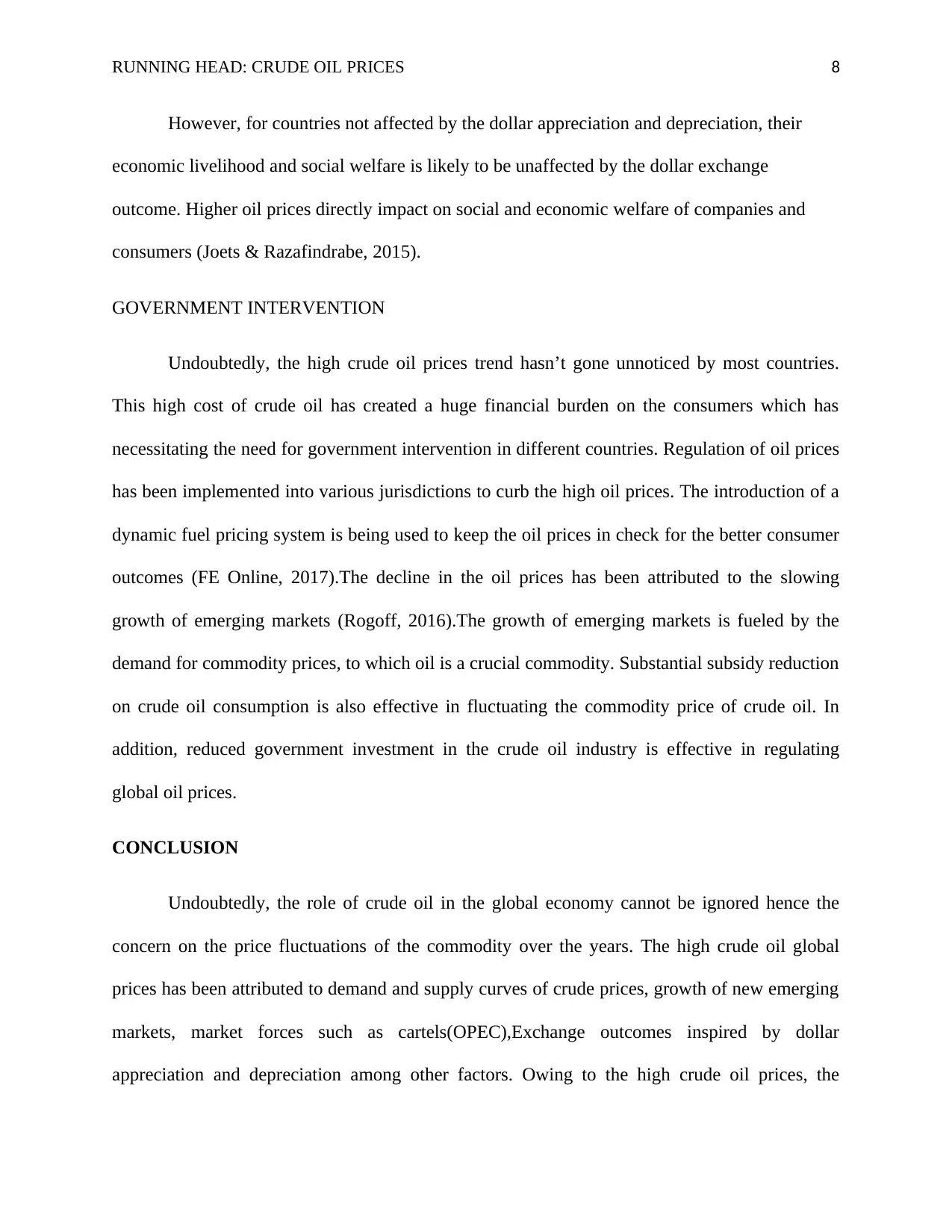
RUNNING HEAD: CRUDE OIL PRICES 8
However, for countries not affected by the dollar appreciation and depreciation, their
economic livelihood and social welfare is likely to be unaffected by the dollar exchange
outcome. Higher oil prices directly impact on social and economic welfare of companies and
consumers (Joets & Razafindrabe, 2015).
GOVERNMENT INTERVENTION
Undoubtedly, the high crude oil prices trend hasn’t gone unnoticed by most countries.
This high cost of crude oil has created a huge financial burden on the consumers which has
necessitating the need for government intervention in different countries. Regulation of oil prices
has been implemented into various jurisdictions to curb the high oil prices. The introduction of a
dynamic fuel pricing system is being used to keep the oil prices in check for the better consumer
outcomes (FE Online, 2017).The decline in the oil prices has been attributed to the slowing
growth of emerging markets (Rogoff, 2016).The growth of emerging markets is fueled by the
demand for commodity prices, to which oil is a crucial commodity. Substantial subsidy reduction
on crude oil consumption is also effective in fluctuating the commodity price of crude oil. In
addition, reduced government investment in the crude oil industry is effective in regulating
global oil prices.
CONCLUSION
Undoubtedly, the role of crude oil in the global economy cannot be ignored hence the
concern on the price fluctuations of the commodity over the years. The high crude oil global
prices has been attributed to demand and supply curves of crude prices, growth of new emerging
markets, market forces such as cartels(OPEC),Exchange outcomes inspired by dollar
appreciation and depreciation among other factors. Owing to the high crude oil prices, the
However, for countries not affected by the dollar appreciation and depreciation, their
economic livelihood and social welfare is likely to be unaffected by the dollar exchange
outcome. Higher oil prices directly impact on social and economic welfare of companies and
consumers (Joets & Razafindrabe, 2015).
GOVERNMENT INTERVENTION
Undoubtedly, the high crude oil prices trend hasn’t gone unnoticed by most countries.
This high cost of crude oil has created a huge financial burden on the consumers which has
necessitating the need for government intervention in different countries. Regulation of oil prices
has been implemented into various jurisdictions to curb the high oil prices. The introduction of a
dynamic fuel pricing system is being used to keep the oil prices in check for the better consumer
outcomes (FE Online, 2017).The decline in the oil prices has been attributed to the slowing
growth of emerging markets (Rogoff, 2016).The growth of emerging markets is fueled by the
demand for commodity prices, to which oil is a crucial commodity. Substantial subsidy reduction
on crude oil consumption is also effective in fluctuating the commodity price of crude oil. In
addition, reduced government investment in the crude oil industry is effective in regulating
global oil prices.
CONCLUSION
Undoubtedly, the role of crude oil in the global economy cannot be ignored hence the
concern on the price fluctuations of the commodity over the years. The high crude oil global
prices has been attributed to demand and supply curves of crude prices, growth of new emerging
markets, market forces such as cartels(OPEC),Exchange outcomes inspired by dollar
appreciation and depreciation among other factors. Owing to the high crude oil prices, the
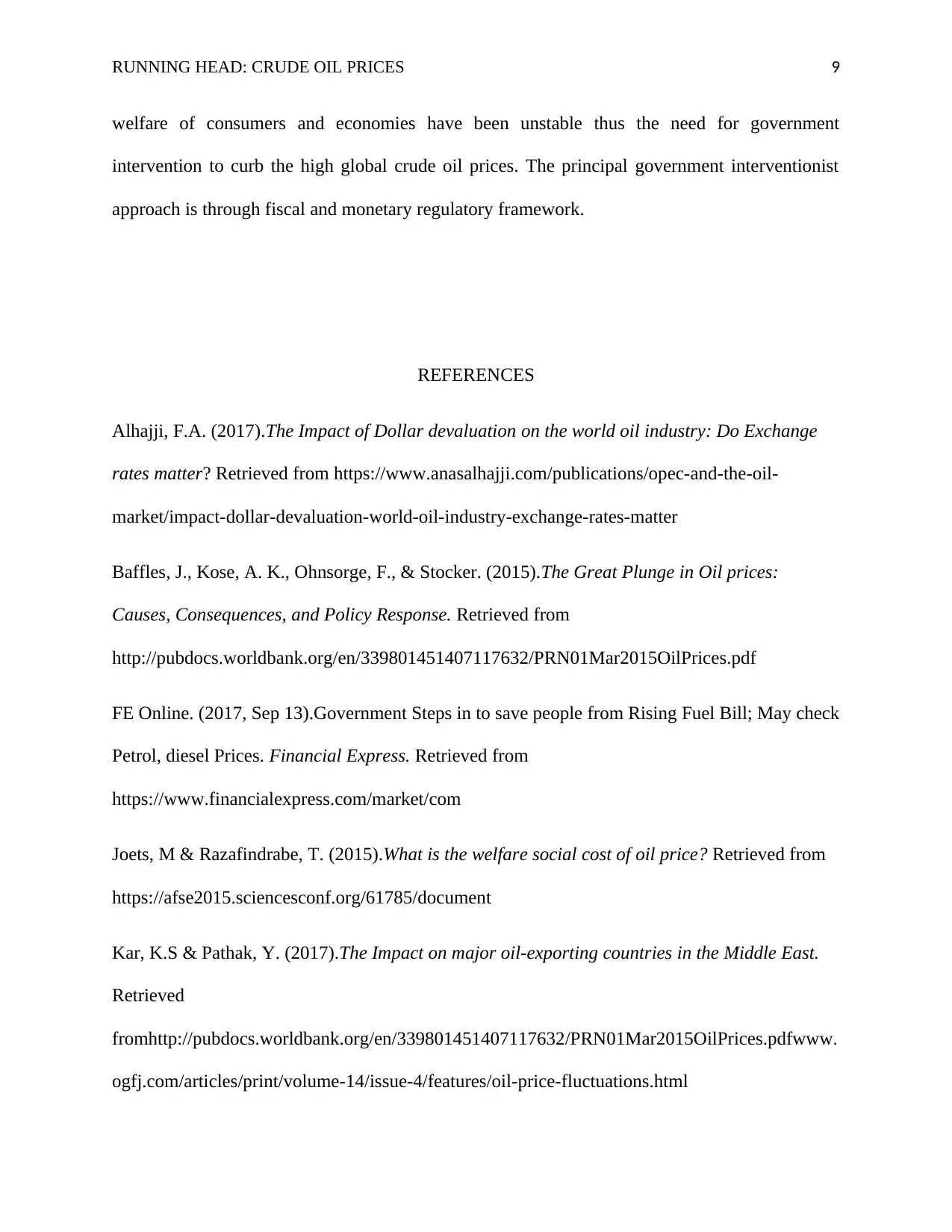
RUNNING HEAD: CRUDE OIL PRICES 9
welfare of consumers and economies have been unstable thus the need for government
intervention to curb the high global crude oil prices. The principal government interventionist
approach is through fiscal and monetary regulatory framework.
REFERENCES
Alhajji, F.A. (2017).The Impact of Dollar devaluation on the world oil industry: Do Exchange
rates matter? Retrieved from https://www.anasalhajji.com/publications/opec-and-the-oil-
market/impact-dollar-devaluation-world-oil-industry-exchange-rates-matter
Baffles, J., Kose, A. K., Ohnsorge, F., & Stocker. (2015).The Great Plunge in Oil prices:
Causes, Consequences, and Policy Response. Retrieved from
http://pubdocs.worldbank.org/en/339801451407117632/PRN01Mar2015OilPrices.pdf
FE Online. (2017, Sep 13).Government Steps in to save people from Rising Fuel Bill; May check
Petrol, diesel Prices. Financial Express. Retrieved from
https://www.financialexpress.com/market/com
Joets, M & Razafindrabe, T. (2015).What is the welfare social cost of oil price? Retrieved from
https://afse2015.sciencesconf.org/61785/document
Kar, K.S & Pathak, Y. (2017).The Impact on major oil-exporting countries in the Middle East.
Retrieved
fromhttp://pubdocs.worldbank.org/en/339801451407117632/PRN01Mar2015OilPrices.pdfwww.
ogfj.com/articles/print/volume-14/issue-4/features/oil-price-fluctuations.html
welfare of consumers and economies have been unstable thus the need for government
intervention to curb the high global crude oil prices. The principal government interventionist
approach is through fiscal and monetary regulatory framework.
REFERENCES
Alhajji, F.A. (2017).The Impact of Dollar devaluation on the world oil industry: Do Exchange
rates matter? Retrieved from https://www.anasalhajji.com/publications/opec-and-the-oil-
market/impact-dollar-devaluation-world-oil-industry-exchange-rates-matter
Baffles, J., Kose, A. K., Ohnsorge, F., & Stocker. (2015).The Great Plunge in Oil prices:
Causes, Consequences, and Policy Response. Retrieved from
http://pubdocs.worldbank.org/en/339801451407117632/PRN01Mar2015OilPrices.pdf
FE Online. (2017, Sep 13).Government Steps in to save people from Rising Fuel Bill; May check
Petrol, diesel Prices. Financial Express. Retrieved from
https://www.financialexpress.com/market/com
Joets, M & Razafindrabe, T. (2015).What is the welfare social cost of oil price? Retrieved from
https://afse2015.sciencesconf.org/61785/document
Kar, K.S & Pathak, Y. (2017).The Impact on major oil-exporting countries in the Middle East.
Retrieved
fromhttp://pubdocs.worldbank.org/en/339801451407117632/PRN01Mar2015OilPrices.pdfwww.
ogfj.com/articles/print/volume-14/issue-4/features/oil-price-fluctuations.html
Secure Best Marks with AI Grader
Need help grading? Try our AI Grader for instant feedback on your assignments.
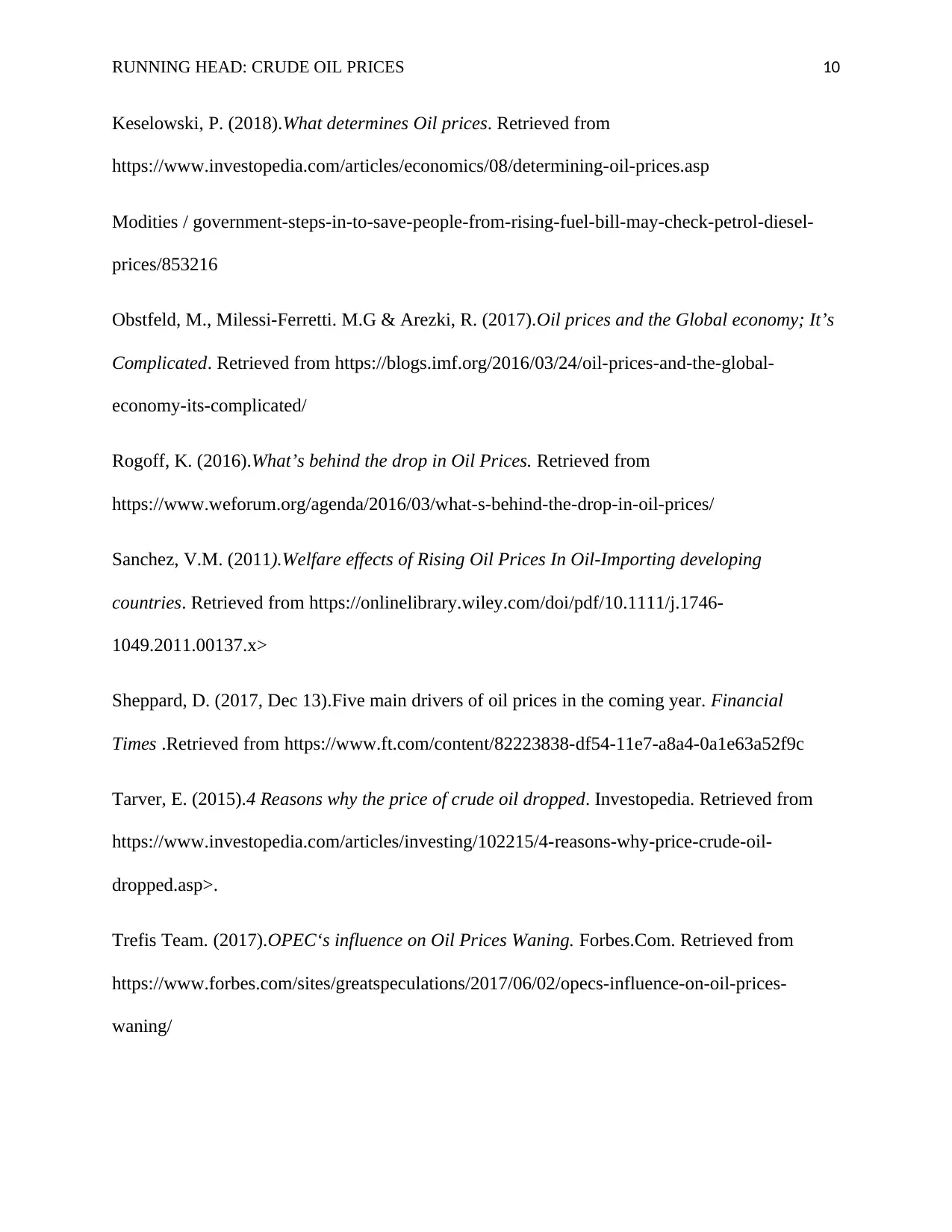
RUNNING HEAD: CRUDE OIL PRICES 10
Keselowski, P. (2018).What determines Oil prices. Retrieved from
https://www.investopedia.com/articles/economics/08/determining-oil-prices.asp
Modities / government-steps-in-to-save-people-from-rising-fuel-bill-may-check-petrol-diesel-
prices/853216
Obstfeld, M., Milessi-Ferretti. M.G & Arezki, R. (2017).Oil prices and the Global economy; It’s
Complicated. Retrieved from https://blogs.imf.org/2016/03/24/oil-prices-and-the-global-
economy-its-complicated/
Rogoff, K. (2016).What’s behind the drop in Oil Prices. Retrieved from
https://www.weforum.org/agenda/2016/03/what-s-behind-the-drop-in-oil-prices/
Sanchez, V.M. (2011).Welfare effects of Rising Oil Prices In Oil-Importing developing
countries. Retrieved from https://onlinelibrary.wiley.com/doi/pdf/10.1111/j.1746-
1049.2011.00137.x>
Sheppard, D. (2017, Dec 13).Five main drivers of oil prices in the coming year. Financial
Times .Retrieved from https://www.ft.com/content/82223838-df54-11e7-a8a4-0a1e63a52f9c
Tarver, E. (2015).4 Reasons why the price of crude oil dropped. Investopedia. Retrieved from
https://www.investopedia.com/articles/investing/102215/4-reasons-why-price-crude-oil-
dropped.asp>.
Trefis Team. (2017).OPEC‘s influence on Oil Prices Waning. Forbes.Com. Retrieved from
https://www.forbes.com/sites/greatspeculations/2017/06/02/opecs-influence-on-oil-prices-
waning/
Keselowski, P. (2018).What determines Oil prices. Retrieved from
https://www.investopedia.com/articles/economics/08/determining-oil-prices.asp
Modities / government-steps-in-to-save-people-from-rising-fuel-bill-may-check-petrol-diesel-
prices/853216
Obstfeld, M., Milessi-Ferretti. M.G & Arezki, R. (2017).Oil prices and the Global economy; It’s
Complicated. Retrieved from https://blogs.imf.org/2016/03/24/oil-prices-and-the-global-
economy-its-complicated/
Rogoff, K. (2016).What’s behind the drop in Oil Prices. Retrieved from
https://www.weforum.org/agenda/2016/03/what-s-behind-the-drop-in-oil-prices/
Sanchez, V.M. (2011).Welfare effects of Rising Oil Prices In Oil-Importing developing
countries. Retrieved from https://onlinelibrary.wiley.com/doi/pdf/10.1111/j.1746-
1049.2011.00137.x>
Sheppard, D. (2017, Dec 13).Five main drivers of oil prices in the coming year. Financial
Times .Retrieved from https://www.ft.com/content/82223838-df54-11e7-a8a4-0a1e63a52f9c
Tarver, E. (2015).4 Reasons why the price of crude oil dropped. Investopedia. Retrieved from
https://www.investopedia.com/articles/investing/102215/4-reasons-why-price-crude-oil-
dropped.asp>.
Trefis Team. (2017).OPEC‘s influence on Oil Prices Waning. Forbes.Com. Retrieved from
https://www.forbes.com/sites/greatspeculations/2017/06/02/opecs-influence-on-oil-prices-
waning/
1 out of 11
Related Documents
Your All-in-One AI-Powered Toolkit for Academic Success.
+13062052269
info@desklib.com
Available 24*7 on WhatsApp / Email
![[object Object]](/_next/static/media/star-bottom.7253800d.svg)
Unlock your academic potential
© 2024 | Zucol Services PVT LTD | All rights reserved.





